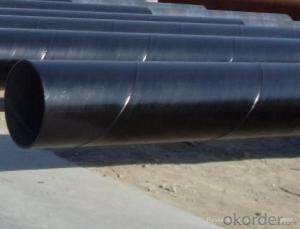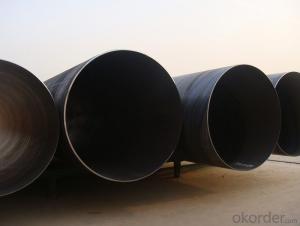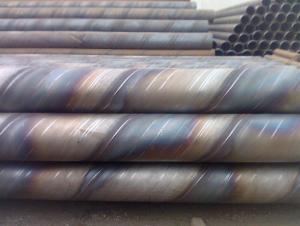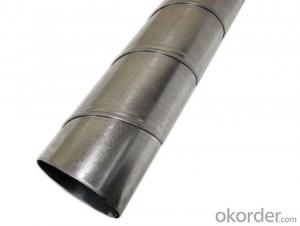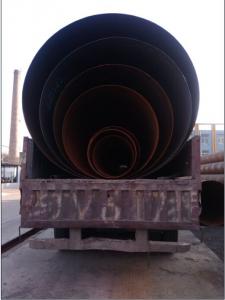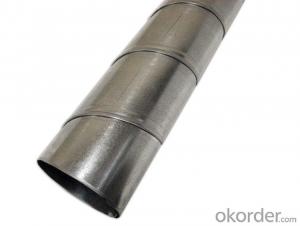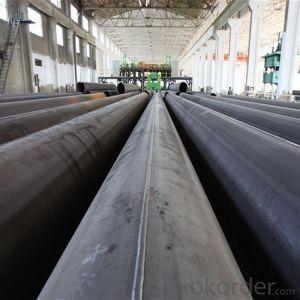SPIRAL STEEL PIPE 32’‘ ASTM / ISO / API/ EN / DIN
- Loading Port:
- China Main Port
- Payment Terms:
- TT OR LC
- Min Order Qty:
- -
- Supply Capability:
- -
OKorder Service Pledge
OKorder Financial Service
You Might Also Like
Packaging & Delivery
Packaging Detail: | standard export packing or as customer's requirement |
Delivery Detail: | within 10 - 30 days |
Specifications
Spiral Welded Steel Pipes and Tubes
1.Material:Q195-Q235
2.Length:1-12m
3.WT:1.0-14mm
4.O.D.:20-273mm
Spiral Welded Steel Pipes and Tubes
Product Description:
1.Material : Q235,Q345,L245,L290,L360,L415,L450,L485,GrB,X42,46,X52,X56,X60,X65,X70,X80,X100
2,Standard: SY/T5037-2000,GB/T9711-2011,API Spec 5L PSL1/PSL2,ASTM A252\A53,ISO3183,DIN17172,EN10217,JIS G3457,AWWA C200,ASTM A139,ASTM A671,ASTM A672
3.Wall thickness: 3.0mm-30mm
4.Outer diameter: φ168mm-3020mm
5,Length: 5m-12m or as your requirement
6,Corrosion protection standard: DIN30670,DIN30671, AWWAC210, AWWA C203, SY/T0413-2002,SY/T0414-2002
7,Application: Oil, gas, natural gas, water pipe, thermal electricity pipe, steel structure engineering, etc
Q195-q345 Material Steel Pipe's Materials
Elements | Chemical Compsition% | Mechanical Property | ||||||
| C% | Mn% | S% | P% | Si% | Yield Point (Mpa) | Tensile Strength(Mpa) | Elongation |
Q195 | 0.06-0.12 | 0.25-0.50 | <0.050 | <0.045 | <0.030 | >195 | 315-430 | 32-33 |
Q215 | 0.09-0.15 | 0.25-0.55 | <0.05 | <0.045 | <0.030 | >215 | 335-450 | 26-31 |
Q235 | 0.12-0.20 | 0.30-0.70 | <0.045 | <0.045 | <0.030 | >235 | 375-500 | 24-26 |
Q345 | <0.20 | 1.0-1.6 | <0.040 | <0.040 | <0.55 | >345 | 470-630 | 21-22 |
- Q: What is the difference between carbon steel and stainless steel pipes?
- The main difference between carbon steel and stainless steel pipes lies in their composition and rust resistance properties. Carbon steel pipes are primarily made of iron and carbon, making them less resistant to corrosion and prone to rusting. On the other hand, stainless steel pipes contain chromium, which gives them excellent rust resistance and durability. This makes stainless steel pipes ideal for use in environments where corrosion is a concern, such as in plumbing systems and industrial applications.
- Q: What is DN50 for welded pipe?
- Commonly used in the market DN50 seamless steel pipe, the outer diameter has two specifications: A, 57mm, B, 60mm, if no special instructions, commonly used is 57mm. The outer diameter of the welded pipe is only 60mm this specification.
- Q: How are steel pipes used in the manufacturing of boilers and heat exchangers?
- Boilers and heat exchangers rely on steel pipes as an essential component due to their exceptional properties and capabilities. These pipes are specifically designed to endure high temperatures, pressures, and corrosive environments, making them highly suitable for these purposes. When constructing boilers, steel pipes are employed to form the main body or shell. This shell contains the water or steam that is heated to generate heat or produce steam for diverse industrial processes. The steel pipes used in boilers are typically seamless or welded, possessing precise dimensions and exceptional strength to ensure structural integrity and prevent any potential leaks. Heat exchangers, on the other hand, are devices used for transferring heat between two fluids, often with varying temperatures. Steel pipes are utilized in heat exchangers as the primary medium for heat transfer. The pipes are commonly arranged in a pattern, allowing the hot fluid to pass through one set of pipes while the cold fluid passes through another set. This arrangement facilitates efficient heat transfer between the two fluids. The use of steel pipes in boilers and heat exchangers provides numerous advantages. Firstly, steel pipes exhibit excellent thermal conductivity, enabling efficient heat transfer between the fluid and the surrounding environment. Secondly, steel pipes possess high tensile strength and can withstand high pressures, ensuring the safety and reliability of the equipment. Thirdly, steel pipes are highly resistant to corrosion, which is crucial in environments where the processed fluids are corrosive or contain impurities. Furthermore, steel pipes can be easily fabricated and customized to meet the specific requirements of boilers and heat exchangers. They can be manufactured in various sizes, lengths, and thicknesses to accommodate diverse applications. Additionally, steel pipes can be coated or lined with materials such as ceramic or epoxy to provide additional protection against corrosion or abrasion. In conclusion, steel pipes play a crucial role in the manufacturing of boilers and heat exchangers. Their exceptional properties, including high strength, thermal conductivity, and corrosion resistance, make them the optimal choice for these applications. The use of steel pipes ensures the efficient operation, safety, and longevity of boilers and heat exchangers in various industrial processes.
- Q: How do steel pipes perform in extreme weather conditions?
- Steel pipes are highly resilient and perform exceptionally well in extreme weather conditions. They have excellent resistance to corrosion, impact, and temperature variations, making them ideal for withstanding harsh environments such as extreme heat, cold, and heavy rainfall. Moreover, steel pipes are known for their durability and strength, ensuring that they can withstand the forces exerted by high winds, snow, and even seismic activities. Overall, steel pipes are a reliable choice for various applications in extreme weather conditions.
- Q: How can galvanized steel tubes be painted on the surface?
- Suitable for galvanized base material (antirust primer), epoxy zinc yellow primer (double component), epoxy ester zinc yellow primer.Pretreatment of galvanized sheet when brushing:1, conditional, you can zinc plating phosphating treatment, or first spray a layer of phosphating primer.2, or smooth zinc plating surface sweeping treatment.3, the galvanized workpiece, galvanized pipe surface with solvent (that is, epoxy zinc yellow primer, thinner) wipe, in order to remove the workpiece crude oil protective layer, and increase cleanliness.4, two-component epoxy zinc yellow primer: in strict accordance with the proportion of paint and curing agent paint, and aging 30 minutes later, modulation suitable construction viscosity, you can spray.One component epoxy ester primer: zinc yellow construction viscosity suitable to construction of modulation, the correct construction method.
- Q: How are steel pipes used in the manufacturing of appliances?
- Steel pipes are commonly used in the manufacturing of appliances for various purposes such as transporting fluids, gases, and air within the appliance, providing structural support, and acting as conduits for electrical wiring. They are also used for creating ventilation systems and heat transfer mechanisms, ensuring efficient operation and durability of appliances.
- Q: How do steel pipes handle seismic expansion joints?
- Steel pipes handle seismic expansion joints by incorporating flexible components, such as bellows or expansion joints, which can absorb the movement caused by seismic activity. These flexible components allow the pipes to expand and contract without causing stress or damage to the system, ensuring the integrity and longevity of the pipeline during seismic events.
- Q: How are steel pipes protected against seismic activities?
- Steel pipes are protected against seismic activities through various measures. One common method is the use of seismic restraint systems, which include bracing, clamps, and supports that are designed to withstand the forces generated during an earthquake. Additionally, pipes can be coated with corrosion-resistant materials to enhance their durability and resistance to seismic events. Regular inspection and maintenance of the pipes are also essential to ensure their continued protection against seismic activities.
- Q: How are steel pipes used in the water supply system?
- Steel pipes are commonly used in the water supply system due to their durability, strength, and corrosion resistance. They are used to transport water from water treatment plants to homes, buildings, and industries. Steel pipes are also used for underground water mains, as they can withstand high pressures and are less likely to leak or break. Additionally, steel pipes are often used in water storage tanks and pumping stations to ensure a reliable and efficient water supply.
- Q: How are steel pipes used in the chemical industry?
- Steel pipes are widely used in the chemical industry for various purposes such as transporting chemicals, gases, and liquids. They are known for their strength, durability, and resistance to corrosion, making them suitable for handling corrosive substances. Steel pipes are used for transferring raw materials, intermediate products, and final products within chemical plants, as well as for connecting different equipment and machinery. They are essential for maintaining a safe and efficient flow of chemicals throughout the industry.
Send your message to us
SPIRAL STEEL PIPE 32’‘ ASTM / ISO / API/ EN / DIN
- Loading Port:
- China Main Port
- Payment Terms:
- TT OR LC
- Min Order Qty:
- -
- Supply Capability:
- -
OKorder Service Pledge
OKorder Financial Service
Similar products
Hot products
Hot Searches
Related keywords
